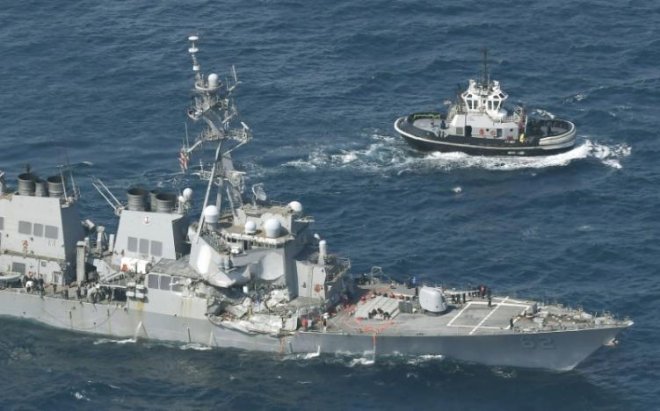
The US Seventh Fleet said on Sunday that the bodies of a number of sailors who were missing after the US Navy destroyer USS Fitzgerald collided with a container vessel were found in flooded compartments of the damaged ship.
The Japan media said all seven of the sailors who had been reported missing were found dead. "Divers were able to access the space and found a number of bodies," the Seventh Fleet said in a statement.
In an earlier statement, it said that the sailors were being transferred to a US naval hospital where they would be identified. "The families are being notified and being provided the support they need during this difficult time," the Seventh Fleet told Reuters.
On Sunday, the commander of the Seventh Fleet said the USS Fitzgerald came close to sinking or foundering after the collision ripped a big gash under the warship's waterline. "The damage was significant. There was a big gash under the water," Vice Admiral Joseph Aucoin said in a news conference at Yokosuka naval base. He added that the crew managed to save the ship with desperate damage control efforts.
According to him, the Fitzgerald is salvageable but the repair works will likely take months. "Hopefully less than a year. You will see the USS Fitzgerald back," he said. However, Aucoin declined to say how many of the sailors were found. The search at sea, has been called off, he added.
The Fitzgerald, an Aegis guided missile destroyer, collided with the Philippine-flagged merchant vessel more than three times its size some 56 nautical miles southwest of Yokosuka early on Saturday.
The Navy said three people were medically evacuated to the US Naval Hospital in Yokosuka after the collision, including the ship's commanding officer, Commander Bryce Benson, who was reported to be in stable condition. The other two were being treated for lacerations and bruises.
A US Navy spokesman in Yokosuka said the USS Fitzgerald sailed into port on Saturday evening, listing around 5 degrees. The flooding was in two berthing compartments, the radio room and auxiliary machine room.
The bodies were found in the berthing compartments, the navy spokesman said, suggesting they could have been asleep at time of collision. There were 285 crew onboard.
Benson took command of the Fitzgerald on May 13. He had previously commanded a minesweeper based in Sasebo in western Japan. However, it was not clear how the collision happened. "Once an investigation is complete then any legal issues can be addressed," a spokesman for the US 7th Fleet said.
Japanese authorities were looking into the possibility of"endangerment of traffic caused by professional negligence", Japanese media reported, but it was not clear whether that might apply to either or both of the vessels.
The US Navy said the collision happened at about 2.30am local time, while the Japanese Coast Guard said it was 1.30am local time.
The Fitzgerald suffered damage on her starboard side above and below the waterline, causing "significant damage", the US Navy said on Saturday.
Japan's Nippon Yusen KK, which charters the container ship, ASX Crystal, said in a statement on Saturday it would "cooperate fully" with the Coast Guard's investigation of the incident.
At around 29,000 tons displacement, the ship dwarfs the 8,315-ton US warship. It was carrying 1,080 containers from the port of Nagoya to Tokyo.
None of the 20 crew members aboard the container ship, all Filipino, were injured, and the ship was not leaking oil, Nippon Yusen said. The ship arrived at Tokyo Bay later on Saturday.
The waterways approaching Tokyo Bay are busy with commercial vessels sailing to and from Japan's two biggest container ports in Tokyo and Yokohama.








